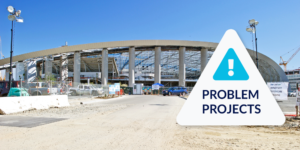
An April 13, 2021 lawsuit by the California-based Penhall Company seeks to foreclose on its mechanics lien on Los Angeles’ SoFi Stadium after what it claims is repeated non-payment from Turner AECOM-Hunt, a joint venture of contractors Turner Construction Company and AECOM Hunt.
The SoFi stadium serves as the home for the National Football League’s Los Angeles Rams and Los Angeles Chargers, as well as a concert venue, opened in September of 2020 — and has continued to be plagued with construction payment disputes and funding issues.
Filing a mechanics lien allows a contractor to gain a security interest in a project’s property. Often, filing a lien is enough to secure payment, and thus lien foreclosure is relatively rare. However, this step can be necessary after other options have been exhausted.
Penhall’s suit requests $913,354.28, not including necessary interest and fees, and asks that SoFi Stadium be foreclosed upon should Turner AECOM-Hunt continue to fail to pay — though this course of action is highly unlikely for such a high-profile property.
SoFi Stadium subcontractor claims non-payment after scope of work changes
Penhall’s suit claims that it initially entered into a subcontract agreement with Turner AECOM-Hunt on May 22, 2019 for demolition work not to exceed $30,000, which included core drilling, concrete sawing, concrete demolition and removal, and highway grinding.
However, the scope of this work expanded on multiple occasions. The first agreed change to Penhall’s subcontract resulted in the contract amount being increased to $486,008. Following this, Penhall says it was instructed to perform additional work at a value of $456,938.78 — resulting in a total cost of $942,946.78.
Though Penhall claims it fulfilled all aspects of the contract and has requested payment of the agreed-upon sum, it alleges that Turner AECOM-Hunt has only paid $29,592.50, leaving an outstanding balance of $912,946.78 with interest.
In reaction, Penhall filed a mechanics lien on SoFi Stadium on January 15, 2021 for $916,136.57 (the then-current amount plus interest). It reiterated in its lawsuit that Turner AECOM-Hunt filed no complaints about Penhall’s work, and that it has no grounds to invalidate the mechanics lien.
Costing over $5 billion total, SoFi Stadium opened on September 8, 2020 prior to the start of the National Football League’s 2020 season, though the stadium’s immediate financial impact was softened due to regulations surrounding the COVID-19 pandemic — the NFL season ended with SoFi Stadium’s occupation at 0% for its entire duration.
“This building will stand the test of time and be a great tribute to Angelenos and what we can accomplish for decades to come,” said Los Angeles Rams chief operating officer Kevin Demoff. “But I would be lying if I didn’t say every now and then, ‘I cannot believe that this building will be empty against the [Dallas] Cowboys.'”
Work claims and other financial issues have plagued SoFi Stadium for over a year
Penhall’s lawsuit is far from the only recent legal action regarding non-payment connected to SoFi Stadium, as millions of dollars in liens have been filed against the project since the beginning of 2020.
In March 2020, subcontractor Smith Emery Company placed a $4.4 million lien against the stadium. Though it was quickly satisfied, the lien served as notice of what could be expected in the upcoming year — by December 2020, the stadium was facing $3.4 million in active unpaid construction claims.
It’s certainly possible that the National Football League’s loss of revenue from the pandemic has impacted teams’ available capital as they have continued to expand into larger markets and relocate franchises.
“It was a huge financial hit for us this year, no question about it,” said New York Giants co-owner John Mara.
In addition, the Los Angeles Rams and Los Angeles Chargers each will pay $645 million to the NFL from December 2019 until December 2028 for their relocations from St. Louis and San Diego, respectively. Given that SoFi Stadium was privately funded by Los Angeles Rams ownership, these fees have likely made an impact on the project’s development.
SoFi Stadium isn’t the only home of an NFL team facing these issues, either. In September 2020, as faced $1.5 million in liens, representatives of the Las Vegas Raiders stated that it had $162 million in outstanding construction payments as of July 15, 2020 related to the construction of Allegiant Stadium. Similar to the Rams and Chargers, the Raiders are additionally paying $378 million to the NFL for relocation over a 10-year period beginning in 2020.